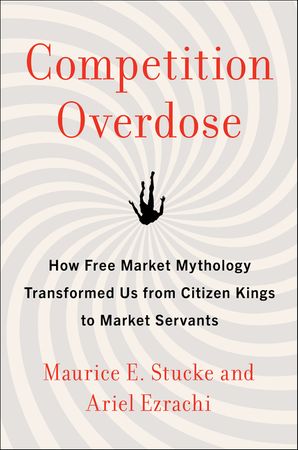
Legal experts Arielo Ezrachi and Maurice Stucke diagnose the symptoms of competion run amock - how market-based solutions increase inequality, kill entrepreneurship, hurt consumers, and destroy healthy industry ecosystems - and provide remedies that will ensure sustainable growth and progress for all.
Whatever illness our society suffers, competition is often the cure. Do we want better education for our children? Then subject the public schools to greater competition. Better prisons? Same principle. Greater happiness? Same again – increase our choices, from food to potential dates – and lower the prices we pay through more competition.
Competition, we are told, will improve our overall welfare. And yet many of us, despite the greater competition, feel increasingly left behind. We are working more, yet getting less. Or alternatively, paying less but getting much less. We complain about the symptoms – our chicken has undeclared additives, our minced beef includes horse meat, our kids’ education is failing – and our anxiety increases. Often, we are told to keep calm and move on. Competition will cure our ailments, once we minimize the bloated regulatory state.
Many times competition is indeed the cure. At other times, however, it is like mercury, glittery but toxic. The problem is that, as a society, we seldom distinguish when competition is the cure or poison, and we are overdosing. Faced with an almost religious belief in elevating rivalry as the key vehicle for our prosperity, Competition Overdose critically examines competition, its limitations as a cure, and those who prescribe it.
Who pushes this toxic competition? In some markets, powerful organizations design the competitive environment. Like The Hunger Games, a few participants might prevail, most participants lose, and the game’s architects largely benefit. In other markets, everyone is trapped in this race to the bottom, where we all lose. But no one can escape because of existing laws. At times, surprisingly, we are the culprits. We increase the rivalry against our own interests. We hate the rivalry yet cannot jump off the treadmill.
But there is hope. Market forces, when administered properly in the right markets, can do wonders. In other markets, however, we need alternatives, whether better government regulation, more cooperation, or simply a de-emphasis of competition.
Competition Overdose both diagnoses the disease and provides a way to cure it.